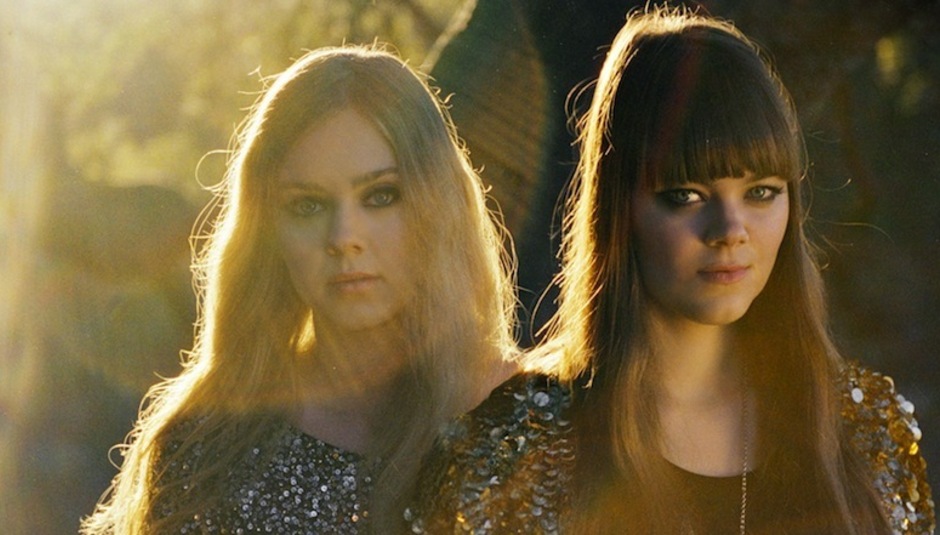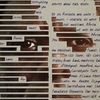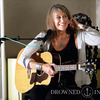I think there’s a good chance that First Aid Kit are one of the first – perhaps even the first? - band to play two different Albert Halls in the space of a week. A few days after I meet them in Manchester, they’re set to play the biggest show of their career to date – in terms of prestige, at least, if not the size of the audience – at the Royal Albert Hall in London; to warm up, they’ve been on a lap of some of Britain’s most beautiful venues, playing to the Old Fruitmarket in Glasgow, the Empire Music Hall in Belfast and, here in the heart of my hometown, the plain old Albert Hall, the city’s newest old concert hall. On the first floor of the building is a gorgeous old Wesleyan chapel that was only last year saved from decades of disuse and turned into a room that, so far at least, seems to exclusively book bands that are a perfect fit for its rustic charms – the Söderberg sisters can count Neutral Milk Hotel, Beirut and Wild Beasts amongst their fellow Albert Hall alumni.
Before it was reclaimed as a rock venue, though, the ground floor of the building had been home to an Irish chain bar of some notoriety. Its planned renovation has yet to take place, and whilst I’m scurrying around the room looking for somewhere for the three of us to sit and talk – their rowdy dressing room proved too noisy – the girls make a beeline for the old light-up dancefloor, blasting out a quick chorus of ‘Stayin’ Alive’ complete with appropriately silly dance moves. It kind of epitomizes the overwhelming impression that I got from talking to the pair that afternoon; that they were in their element on the road, having a frankly inordinate amount of fun.
And why not? Stay Gold, their sophomore record, doesn’t stray far from the winning formula that made their debut, The Lion’s Roar, one of the runaway successes of 2012, but then again, it didn’t need to; the duo’s uncannily sharp harmonisation, intelligent interpolation of folk and country touchpoints and increasing confidence in expansive string arrangements meant that it would’ve been a little bit daft to try to fix what wasn’t broken. They even stuck with the same producer, Mike Mogis of Bright Eyes; once we finally locate the only three chairs left in the old bar, we discuss their second recording trip to Omaha, Nebraska, their increasingly diverse influences, and the surreal nature of working with some of their heroes.
Have you deliberately chosen venues with a little bit of character for this tour, places that lend themselves well to your music?
Klara Söderberg: I think so, yeah. I still love playing dirty rock clubs, though.
Johanna Söderberg: We’ve been planning the Royal Albert Hall show for about eighteen months, at this point; you have to book it so far in advance. We actually kind of based the release of the record around getting that date. We’re trying not to think about it too much, and just think of it as another show, but it’s definitely nerve-wracking now that it’s so close. We’ve never even been there before, much less played there.
KS: We’ve seen it on TV, though!
How much has the stage show changed with this record?
JS: I think, musically, we’ve fleshed things out a bit. There’s definitely more instrumental parts now. Melvin Duffy, who plays pedal steel and electric guitar, has got a bigger role now; we’ve let him have a bit more free reign this time around. Apart from that, we’re still just a four-piece onstage, and we’re still trying to keep it simple. We’ll have strings with us at some shows, but we’re also conscious of the fact that people have come to see us; for a lot of the crowd, the most special moment of the show is when we play ‘Ghost Town’, because it’s totally unplugged.
KS: I like the fact it’s all a little bit rawer live. We don’t necessarily need to do it just like it is on the record.
JS: It’s definitely become more of a show, though. When we started out, it was just the two of us on stage, going up there in t-shirts and jeans or whatever. Now, we’re wearing all gold, we’ve got this huge gold backdrop, and it just makes it more fun - for us, at least.
What made you realise you wanted the shows to be a little bit more of a spectacle?
JS: I think it was Jack White, actually. We were really inspired by the way he’s always worked to make things look striking, as well as sound that way. In The White Stripes, there was always that really arresting colour combination of red, white and black, and now that he’s doing his solo stuff, he’s going for blue, white and black. It just looks really cool, and with the record being called Stay Gold, there was obviously an opportunity for us to gravitate towards a certain palette.
KS: Touring with Jack kind of changed everything for us, really, because it opened our eyes to making the shows something bigger and more impressive than just the music.
You went back to Omaha, Nebraska to record Stay Gold; what’s it like as a place to make music?
JS: It’s just a typical American city in the Midwest; there’s nothing too special about it, really. Not to talk it down, but there’s not a ton of things to do there - especially for us, because neither of us have driver’s licenses.
KS: It was pretty great to be in a place like that when you’re creating something, though. It forces you to focus on nothing else but your work. When we were there, we didn’t spend a lot of time outside of the studio; we might go for a walk around the area that the studio was in, but that was kind of it. It was just a lot less distracting, and cheaper, than going somewhere like New York or Los Angeles. Plus, (producer) Mike Mogis was there, which was the main reason, I guess.
You were out there for five weeks, right? Is that longer than you spent there last time?
JS: Yeah. We actually spent the entire time recording; last time, we crammed all of the recording into two weeks, and then spent another two weeks mixing. It gave us a lot more time to focus on the intricate details, and we brought in far more live performers; even just for little touches, like getting some flute players, things like that. We spent a lot more time in each song, just to make sure that we had more life in the arrangements. We definitely built them up a little bit more than we did in the past.
What’s Mike Mogis like as a producer? Is he pretty hands-on?
JS: He’s definitely a perfectionist. He likes to spend a lot of time on his own; he’s not constantly in the studio, he’s working on his own little things at the same time. That said, he played on every song, so I guess he was pretty directly involved. It’s just that, at times, it was as if he just kind of sat there and added his magic to it; he really makes it seem effortless.
KS: We spent a lot of time just talking about how we wanted each song to develop, even though I actually felt as if we didn’t really need to. We see the world in a similar way, musically, and we have similar reasons for why it is that we’re making music. He’s always been super encouraging; like, when the record came out and started getting good reviews, we called him to tell him, really excited about it, and he said, “oh, that’s cool, but it doesn’t matter, you know? I’m happy with the record, I know it’s great.” That’s such a great attitude. He really listened to the songs, and really tried to understand them.
JS: He just has a way of making arrangements that really bring out emotion in you, I think. He’s done that on all of the Bright Eyes records.
How much were the lyrics on Stay Gold influenced by the kind of life you’ve been living these past couple of years?
JS: A lot, I’d say. The songs are always going to be about our lives and what we’re going through, but at the same time, a lot of them are about things that everybody goes through, that everybody can relate to. It might be about growing up and figuring out your place in the world, or it might be about traveling and long-distance relationships, but I think most of the songs are pretty universal in how they can be understood.
KS: I don’t think we’re ever going to write a record about being a touring rock band, or whatever. The themes tend to be a lot more general; everybody feels lost and lonely from time to time.
What’s ‘Cedar Lane’ about, specifically? That’s probably my favourite track on the record.
JS: Nostalgia, I guess. It’s about the different sides of being attached to a certain memory; it can be a good thing, in some ways, but you can also find yourself being haunted by it.
KS: Yeah, and it’s about trying to let go of that, too. I think that was one of the songs that was most challenging to write for this album; it was really like a puzzle, with all these key changes that we had to piece together. We finished most of the songs at the same time; we’d already set a date for when we needed to go and start recording, and we were panicking about making it, because we only had five songs ready to go for a while. Once fall came around and it got gloomy, we suddenly managed to write a ton more. I guess that says a lot about us.
I read that Townes Van Zandt was a big influence on this record - how so?
KS: He has this darkness about him that’s really alluring, and really beautiful; he’s in touch with his own dark side, but his songs are pretty hopeful, most of the time.
JS: Apart from ‘Waiting Around to Die’, obviously, which is very much “everything’s shit.”
KS: I think the arrangements are a big part of his influence on us, too; he just wrote a ton of really timeless songs. But we do gravitate towards him and people like Gram Parsons, too, who obviously died young and had kind of a sad story. There’s just an extra resonance to their music as a result of the lives they led.
JS: At the same time, though, with a lot of the music we love, it’s difficult to pinpoint quite why you’re so into it; it’s just a feeling you get, a lot of the time. It’s definitely interesting that these guys had tragic lives, but I don’t believe in suffering for your art. I think that’s bullshit. It’s just fascinating to look into the background of artists you love - of course you’re going to be interested in that.
I think the first time I saw you play in town was when you opened for Lykke Li down the road, maybe three years ago; a year later, you were already playing pretty big headline shows in your own right. Was there any specific point at which you could feel things were beginning to pick up?
JS: Probably the last tour that we did for the last record. I think we played The Ritz here, and somewhere pretty big in London, too; I forget the name of it, now. Everything was sold out, everybody was singing the words back at us. It felt like it took a while to get there, to be honest; it was a really slow build.
I believe the prime minister came to see you in London on that tour. Has anybody ever brought that up with you? I can’t help but feel that it’s probably not the healthiest thing for your credibility...
JS: Yeah, we heard about that. I’m not going to stop anybody from coming to our shows, regardless of their opinion or what it is that they do. Music should be accessible to everybody, I guess. (long pause) I don’t think we’re going to say anything else about that, really.
KS: I suppose we try not to let our politics seep into our music.
I just saw you mention on Instagram that you’ve contributed a song called ‘Frozen Lake’ to a Swedish-language film (Min så kallade papa). Do you still feel as if you’re in touch with your Swedish roots?
KS: Definitely. It’ll always be our home, no matter where we are. There’s just so many great things about it, although we have just had pretty much the worst election ever, with a racist party getting into government. Musically, it’s incredible; there’s so much good music from Sweden, old and new. The film industry is in really good shape, too; the movie we wrote ‘Frozen Lake’ for is one of a ton of great ones that have been made recently. Culturally, things are really great there right now.
JS: We obviously get told a lot that we sound American, but it’s impossible for us to think about nationality when we’re making music. We certainly feel more Swedish than anything else, though.
You’ve done a lot of work with Conor Oberst over the past couple of years; has that sunk in yet, given what a hero of yours he is?
KS: We’re getting used to it, for sure. We actually toured with him, and when you’re around somebody every day for a few weeks, you come to realise that they’re a lot like you, really. In some ways, we’ll always be looking up to him; he’ll always be a hero for us in terms of songwriting, I think, but at the same time, he’s also our friend, and that’s like dealing with another person entirely. We just feel very lucky. If you’d told us when we were young teenagers that we’d be working with Conor, we obviously never would have believed you, but I feel like it’s happened very gradually. I think when you have the kinds of experiences that we’ve had recently, when you’re selling out shows like this one, it becomes obvious that the artists you look up to are a lot like you – just people who caught a lucky break.
Have you talked about doing something collaborative with Conor?
KS: We already have, kind of; we’re on maybe six of the songs on his latest record. That was something that we’d planned, that we’d been talking about for a while, and it worked out perfectly because he was recording in Omaha whilst we were there making Stay Gold. We were basically just able to drop in and sing our parts.
You’re on the new Jenny Lewis record too, right?
JS: Yeah, you can just barely hear us! We’re on the last song, the title track. We found her music through Bright Eyes, actually, when we were younger; she’s probably been just as much of an inspiration, as far as our songwriting goes. For me, especially, her stage persona has had a big impact; she’s so entertaining to watch. She always looks like she’s having so much fun up there. I remember we saw her play just as we were starting out playing our own gigs, and her show made me think totally differently about how we presented ourselves.
Are you excited to be playing with Ryan Adams soon? I can definitely hear his influence in some of your songs…
JS: Yeah, that’s true. On this record, especially; ‘Cedar Lane’ and ‘Master Pretender’ were both just us trying to write like Ryan Adams, basically.
KS: Two of the records I was listening to a lot whilst we were writing for this album were Gold and 29. I’ve always loved Gold, but I’d never really gotten into 29 before; I’d heard it, but I didn’t quite fall in love with it until last year. The way he works and writes is totally inspiring; he’s experimented a lot down the years. Just getting to see him live is going to be incredible; it’ll be the first time for both of us.
JS: Our mom did see him a few years ago, playing an acoustic show, but we couldn’t go, because we were on tour. She wouldn’t stop talking about it for months afterwards. So annoying.
KS: I know, right? God. Shut up, mom!
'Stay Gold' is available now via Columbia. First Aid Kit return to the UK in January:
14 – The Forum, BATH
15 – St. David’s Hall, CARDIFF
16 – Symphony Hall, BIRMINGHAM
17 – Apollo, MANCHESTER
19 – Usher Hall, EDINBURGH
20 – City Hall, NEWCASTLE
21 – Royal Concert Hall, NOTTINGHAM
23 – Corn Exchange, CAMBRIDGE
24 – Brighton Dome, BRIGHTON
25 – University of East Anglia, NORWICH
27 – Hammersmith Apollo, LONDON























